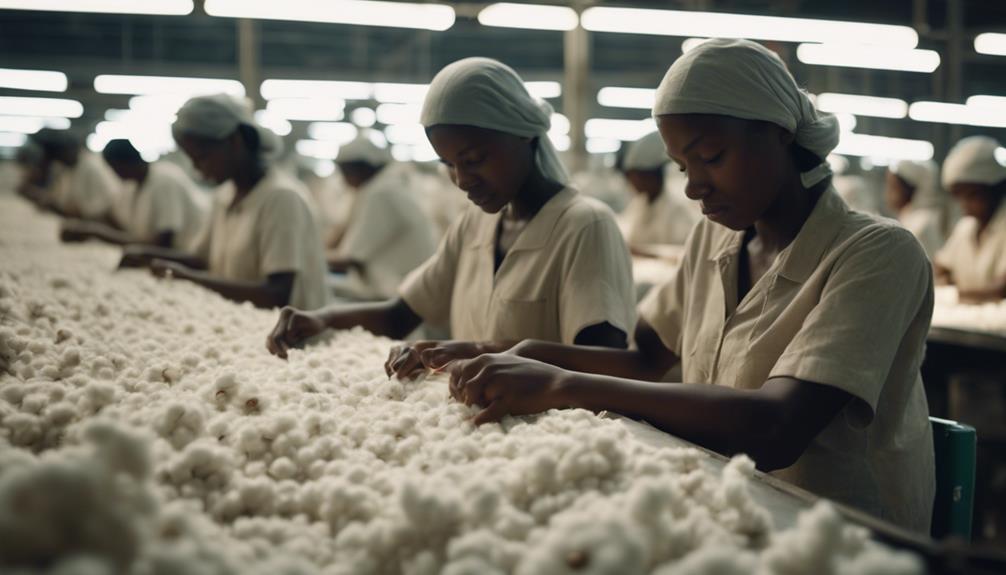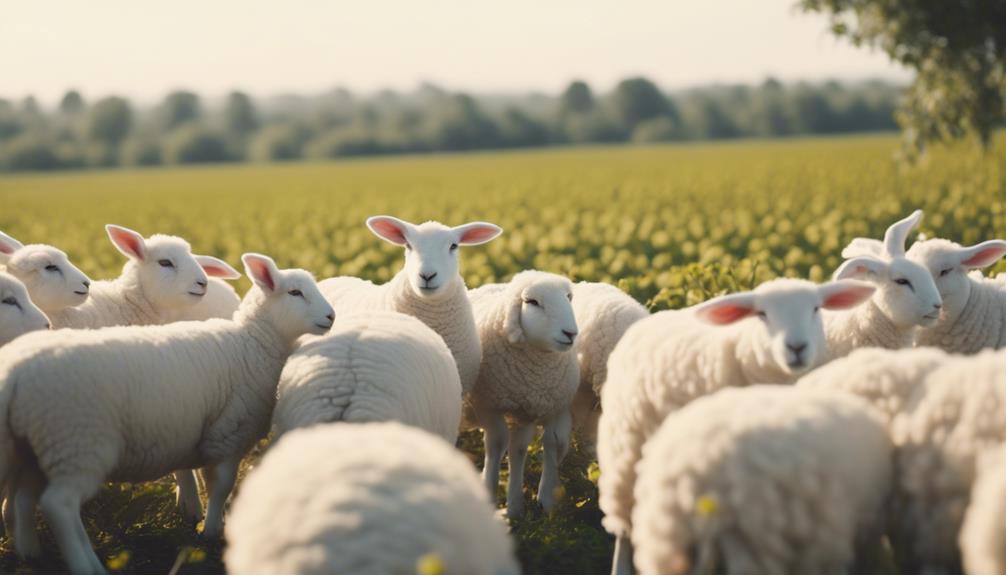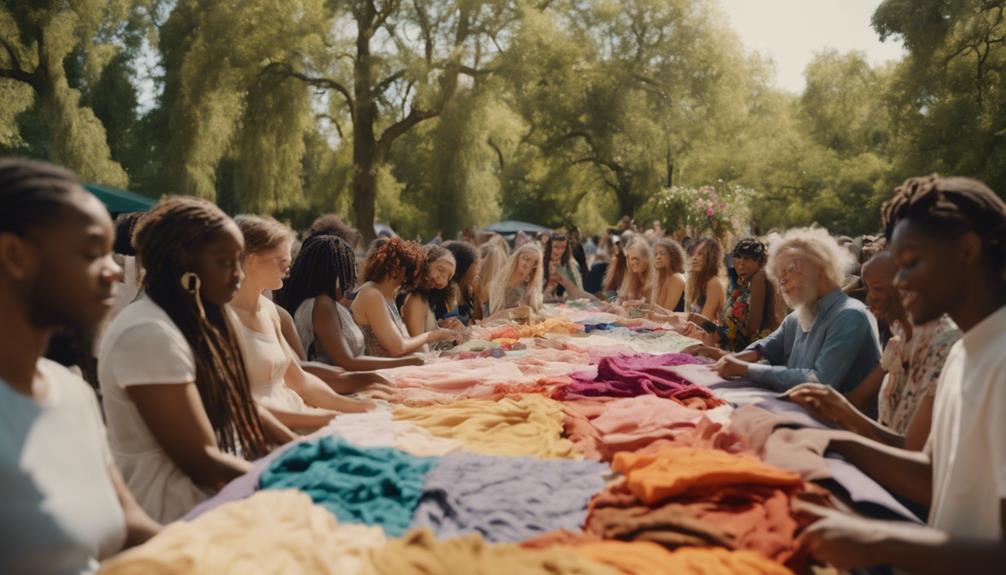Cotton On is known for presenting itself as a sustainable fashion brand, however, the reality is more intricate. Despite its stated ethical standards, the brand has come under fire for its labor practices, with conditions being rated as ‘Not Good Enough’ and only a small portion of its supply chain being certified for worker rights. The use of conventional materials has led to significant pollution and water usage, impacting the environment negatively. While the company has taken steps with initiatives such as using organic cotton and implementing recycling programs, there are still concerns regarding transparency. Delving deeper into the details of these initiatives and identifying the areas needing improvement may alter your perception of Cotton On’s sustainability efforts.
Key Takeaways
- Cotton On's ethical commitment is criticized, with worker treatment and animal welfare rated as 'Not Good Enough' due to inadequate standards and transparency.
- Only 21-30% of Cotton On's supply chain meets crucial labor standards, indicating significant gaps in worker rights and living wages.
- The brand's environmental policies are also rated 'Not Good Enough,' contributing to the fast fashion industry's high water usage and pollution.
- Cotton On promotes organic cotton use and recycling programs, but faces challenges in fully implementing sustainable practices across its operations.
Cotton On's Ethical Commitment
Cotton On's ethical commitment raises concerns due to its lack of substantial actions to support its stated values on environmental and worker welfare. While the company presents a manifesto that emphasizes sustainable fashion, the reality reveals a troubling disconnect.
Its current rating for worker treatment and animal welfare is 'Not Good Enough,' highlighting insufficient practices that fail to meet expectations. Only 21-30% of Cotton On's supply chain is certified by crucial labor standards, indicating limited transparency in their labor practices.
Moreover, Cotton On's environmental policies show little evidence of effective actions to reduce hazardous chemicals or water usage in manufacturing. Although the company claims to adhere to the Five Freedoms in its animal welfare policy, there are no clear mechanisms to enforce these principles.
This raises significant questions about Cotton On's genuine commitment to animal welfare. If you're concerned about ethical fashion, it's important to critically evaluate the company's practices. Without robust actions to back its claims, Cotton On's ethical commitment appears more like a marketing strategy than a real dedication to sustainable fashion.
Environmental Impact Analysis

The environmental impact of fast fashion brands like Cotton On is alarming, as they contribute considerably to overconsumption and waste without taking meaningful steps to mitigate their ecological footprint.
Cotton On's reliance on conventional cotton and polyester results in significant water usage and pollution, while their use of hazardous chemicals in manufacturing raises serious concerns.
Despite the urgent need for sustainable practices, the brand's environmental policies are rated as 'Not Good Enough,' revealing a lack of transparency about their supply chain and practices.
With the fashion industry accounting for about 8% of global greenhouse gas emissions, it's clear that brands like Cotton On play a substantial role in this crisis.
Moreover, less than 1% of clothing materials are recycled, emphasizing the dire need for better recycling initiatives. While organic cotton is a more sustainable option, using 91% less water in production, Cotton On continues to prioritize less eco-friendly materials.
To truly shift towards sustainability, Cotton On must adopt more responsible practices and commit to reducing its environmental impact. Without these changes, the brand will remain part of the fast fashion problem rather than a solution.
Labor Conditions Overview

Labor practices within Cotton On's supply chain are often rated as 'Not Good Enough,' revealing concerning gaps in worker rights and protections. While the company claims to improve wages, you'll find little evidence that workers are actually paid living wages across most of its supply chain. With only a small percentage certified by essential labor standards, it raises serious questions about the ethical implications of their practices.
The 2023 Fashion Transparency Index shows that Cotton On scored between 21-30%, indicating limited disclosure regarding labor conditions and supply chain practices. Additionally, their response to worker health and safety during the COVID-19 pandemic has been inadequate, which further undermines their commitment to labor rights.
When it comes to diversity and inclusion, there's a noticeable lack of evidence supporting any meaningful action in this area, highlighting the need for improvement. If Cotton On wants to truly be seen as a leader in sustainable fashion, it must prioritize ethical labor conditions, guarantee workers are paid living wages, and take significant steps to protect and empower its workforce.
Animal Welfare Concerns

While ethical labor practices are essential, animal welfare also demands attention in Cotton On's sustainability efforts. The brand has established an animal welfare policy aligned with the Five Freedoms, which is a positive step. However, there's no evidence of mechanisms in place to enforce this policy across their supply chain. This lack of accountability raises significant ethical concerns.
Although Cotton On uses wool and leather in its products, it struggles with traceability for these animal-derived materials. This gap highlights issues in ethical sourcing and transparency, leaving consumers questioning the brand's commitment to responsible practices. Currently, Cotton On's animal welfare rating is classified as Not Good Enough, reinforcing worries about its overall animal welfare efforts.
On a slightly positive note, Cotton On doesn't use down, fur, angora, or exotic animal products, which mitigates some animal welfare concerns. Yet, without greater transparency regarding its supply chain and the sourcing of animal products, consumers and advocacy groups remain skeptical.
To truly commit to sustainability, Cotton On must enhance its animal welfare policy, ensuring it aligns with ethical sourcing practices and addresses the call for better traceability in its supply chain.
Sustainable Fashion Alternatives

Sustainable fashion alternatives like Dorsu and MATE the Label offer conscious choices for consumers seeking to reduce their environmental impact. These sustainable brands prioritize ethical and sustainable practices, ensuring their products are made from certified organic materials.
Dorsu, rated Great, focuses on creating conscious wardrobe essentials while maintaining labor standards that help workers thrive in the manufacturing process.
MATE the Label stands out by using GOTS certified organic fabrics, which not only enhance the quality of their clothing but also minimize the environmental footprint. Similarly, Boody, rated Good, utilizes bamboo-based materials, which require less water and pesticides compared to conventional fabrics, making it a more sustainable option.
Honest Basics also emphasizes GOTS certification, ensuring that their production processes adhere to high standards of organic material and fair labor practices. Another Great-rated brand, Know The Origin, champions Fairtrade practices, offering ethically sourced and produced clothing.
Together, these alternatives represent a growing movement in the fashion industry, aiming to reduce environmental harm while promoting ethical labor practices. By choosing these options, you take an important step towards a more sustainable future in fashion.
Community Engagement and Resources

Community engagement plays an essential role in promoting sustainable fashion, enabling you to connect with like-minded individuals and access valuable resources for making ethical choices. Platforms like Good On You foster this engagement by offering insights into ethical fashion, raising awareness about sustainability and fashion waste.
| Community Engagement Activities | Available Resources |
|---|---|
| Clothing Swaps | Good On You Mobile App |
| Discussions on Ethical Fashion | Guides on Sustainability Basics |
| Consumer Education Initiatives | Newsletter with Articles |
Through clothing swaps, you can actively participate in local sustainability efforts while also learning about the impact of fashion waste. Good On You's mobile app allows you to discover ethical brands and access ratings of your favorites, enhancing your awareness and informed purchasing decisions.
Moreover, the platform emphasizes consumer education, providing guides that help you make responsible fashion choices. Engaging with community-driven discussions through journal articles and FAQs encourages a deeper understanding of the fashion industry's impact on people and the planet. By participating in these initiatives, you'll contribute to a more sustainable future in fashion.
Frequently Asked Questions
Is Cotton on Sustainable?
Cotton On isn't sustainable. You'll find their practices contribute to overconsumption, with low transparency in supply chains and minimal efforts to reduce harmful materials. Their overall sustainability rating reflects these shortcomings, scoring just 2 out of 5.
Do People Really Care About Sustainable Fashion?
You bet people care about sustainable fashion! With 71% of millennials prioritizing eco-friendly choices, it's clear that consumers are increasingly demanding ethical practices. Your buying decisions can drive significant change in the fashion industry.
Is Cotton Actually Sustainable?
Did you know that over 90% of cotton is grown using harmful pesticides? While cotton's natural, it's not always sustainable. You should consider organic options to support environmental health and avoid toxic chemicals in your wardrobe.
Does Sustainable Fashion Really Work?
Sustainable fashion's effectiveness often depends on your choices. By researching brands, opting for quality over quantity, and supporting ethical practices, you can influence the industry. Remember, your purchasing power drives real change in fashion sustainability.
What Are the Sustainable Practices of Cotton On in the Fashion Industry?
Cotton On’s sustainable practices in the fashion industry are transparent and genuine, aiming to combat greenwashing in sustainable fashion. The brand focuses on using ethically sourced materials, reducing waste through responsible production methods, and supporting fair labor practices. This commitment sets a positive example for the industry to follow.
Conclusion
To sum up, while Cotton On has made strides toward ethical practices, the question remains: can a brand truly be sustainable if it still contributes to environmental challenges?
As you explore your fashion choices, consider the impact of your purchases on the planet and communities.
By supporting brands that prioritize genuine sustainability, you can help create a more responsible fashion industry.
Every conscious decision you make can lead to a brighter, greener future for all.









